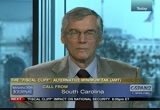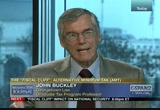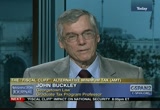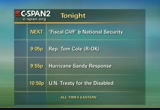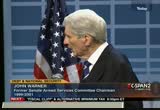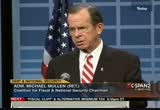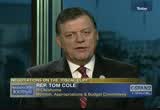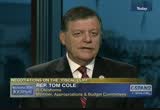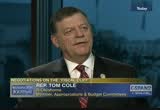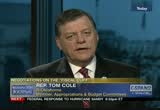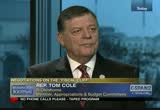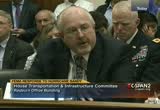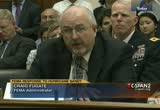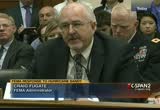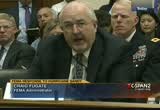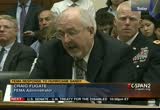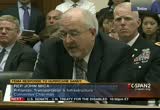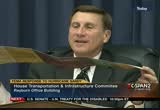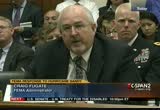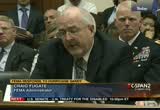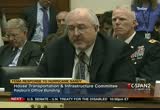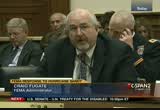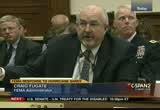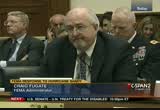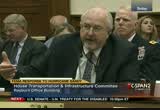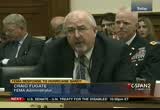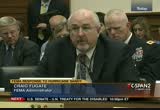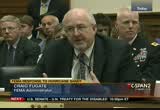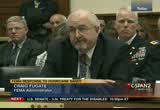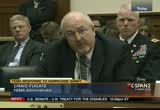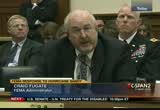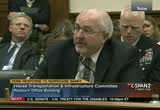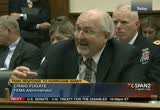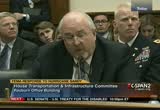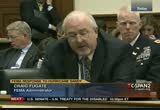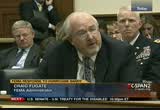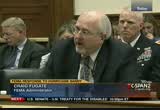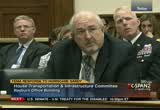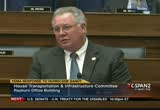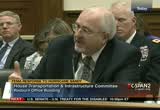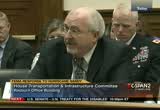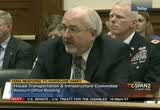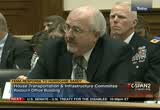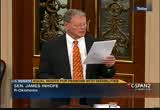tv Tonight From Washington CSPAN December 4, 2012 8:00pm-11:00pm EST
8:00 pm
decide what you're going to do now i once those taxes go up. and then when january 2nd come up, you get a committee together, and you solve the problem. i mean, how is that going to affect everyone when it comes to taxes? is it going to be the same, or will it be different? i mean, do we have to do it early? can we do it in january? >> guest: well, i would argue that there are two pieces to the fiscal cliff in that you have to do amt this year, and you -- because unless you really intend people to pay that additional tax. it would be very hard in the middle of the tax filing system to reverse that decision. now, you are, i think, correct in the second piece of the fiscal cliff. that is the tax rates that will apply next year. arguably, you don't have to take action this year, you have the
8:01 pm
whole of next year during which you can reach resolution to that issue. now, the only reason why i think that's an extraordinarily bad idea is i think it would be viewed quite unfavorably by the financial markets. and so you could see a reaction. and it is really bad tax policy to be legislating in the middle of the tax year on the basic structure of the income tax for that year. >> host: we'll go to jeff in tampa, florida, independent caller. >> caller: good morning, how you doing? >> host: good morning, sir. >> caller: yes, i have a question for mr. buckley, and this is more -- it may be a little generic, but something that a couple of my friends and i have talked about and just trying a basic understanding of. instead of having an income tax, has there ever been any discussion about having a national or a federal sales tax to help offset so this way
8:02 pm
everyone from the rich to the poor, everyone pays the same amount? i mean, i'm not sure the exact amount that you would have to pay, i'm not an economists, but it's just something we've always thought about, and i was just curious what mr. buckley thought. >> guest: well, there were proposals in the middle '90 from then-republican ways and means committee chairman bill archer to totally repeal the income tax and replace it with a national sales tax. they never went anywhere for a variety of reasons, the first is the rate of the tax would have to be extraordinarily high. well above 20%, in the mid to upper 20s, the replacement tax rate on a consumption tax basis would have to be -- the rate would have to be that high. also they're extraordinarily
8:03 pm
regressive taxes. individual at the poverty line would be paying a 25% rate on his or her consumption just as would somebody making a million dollars a year. so it would be, it would involve an extraordinarily regressive shift of tax burden. i also think we are an economy that is driven by consumer demand. i cannot think of anything that would be more guaranteed to put the economy in a recession than increasing the price of all goods and services that we purchase by 20-25%. >> host: we'll give brad on twitter the last word here. he says negotiate and simplify, let the republicans lower taxes and get rid of the amt. john buckley, thank you for your help this morning in helping us try to understand the alternative minimum tax, appreciate it. >> guest: okay, good.
8:04 pm
>> in a few moments, a discussion of house spending cuts in the so-called fiscal cliff. in a little less than an hour, more about the fiscal cliff with republican representative tom cole from oklahoma. then the head of fema testifies on capitol hill about the government's response to hurricane sandy. and later, senate debate on the u.n. treaty for the disabled. ♪ ♪ >> this weekend on c-span3's american history tv, follow harry truman easeleddest grandson to hiroshima as the city prepared to mark the bombing of the city in 1945. >> you know, everybody has their own view what happened, and i, i don't, i don't want to argue
8:05 pm
survival with anyone in japan about the history. i think we're past that. my whole purpose for being here is to listen, to honor the dead, to listen to the living and to see -- to do what i can to see this doesn't happen again. >> clifton truman daniel will join us sunday at 9 p.m. eastern on c-span3. >> now, a discussion of how the military and national security might be affected by spending cuts scheduled to take effect the first of the year. part of the so-called fiscal cliff. former chairman of the joint chiefs of staff, admiral mike mullen, was joined by the chairmen of the senate house armed services committee. this is a little less than an
8:06 pm
hour. >> good afternoon. thank you for coming. my name is. peter:rerson -- peterson. i want to give you, first, a review of our foundation and why we are supporting the project you're going to hear about today. starting about 30 years ago after studying the profound demographic trends and the vast and unfunded promises that we had made, i decided that our projected long-term -- and i emphasize long-term debts -- were not only unsustainable, but a primary threat to our future. speaking of unsustainable, in the nixon white house in which i served, herb stein was chairman of the council of economic advisers, and he used to say if something's unsustainable, he said it tends to stop. or he said if you don't like that, if your horse dies, i suggest you dismount.
8:07 pm
well, i think we've been behaving as though we can ride this debt horse more or less indefinitely. in lieu of a quiet retirement and as a confirmed masochist, i decided to set up a nonpartisan foundation whose principal mission would be to increase awareness of the long-term debts and various solutions and try to get something done. never in my experience have our fiscal security, our economic security and our national security been more closely linked. indeed, in the words of admiral mullen, the single greatest threat to our national security is our debt. we are endlessly reminded that everything must be on the table, including defense, which accounts for about 20% -- as you probably know -- of the budget.
8:08 pm
but defense doesn't really seem to be on the table in terms of widely-discussed solutions or strategies. instead, we confront sequestration, a thoroughly bad idea for getting a defense budget or any other budget. unless we take action, we could face a fiscal or economic crisis that forces cuts to our military priorities, steep and arbitrary cuts that are neither coherent, nor prioritized. the question is, can we and how do we achieve savings that can improve our fiscal outlook while meeting our national security needs? to quote admiral mullen again, he said the pentagon budget was basically doubled in the last decade, and in doubling we have lost the ability to prioritize.
8:09 pm
to make hard decisions, to do tough analyses, to make trades. we also need a review of our defense strategy that makes sure that we are preparing for the threats and risks of the 21st century, not those of the past. the foundation has funded two efforts along these lines to help advance the best ideas for improving our defense strategy. earlier this year we funded a project by the stimson center which brought together 15 defense experts to examine our strategic defense priorities in some detail and how they should be reformed. today we announce the new coalition for fiscal and national security. the coalition, chaired by admiral mullen, includes senior national security defense and
8:10 pm
economic officials from both republican and democratic administrations stretching back to more than 30 years as well as leaders from the congress including some very distinguished gentlemen here today. all have served our nation with distinction, and they are joining together now to say very clearly that our leaders must find solutions to our long-term fiscal challenges, because our nation's security depends on it. it's now my pleasure to introduce the chairman of the coalition, admiral mike mullen, chairman of the joint chiefs of staff, capped a very distinguished 43-year career in the united states navy including service as chief of naval operations. wile serving in the -- while serving in the navy, he also managed to obtain advanced management training at the harvard business school.
8:11 pm
few have the combination of practical military experience and sharp budgeting and management knowledge that admiral mullen possesses. respect for mike mullen is a major reason so many distinguished individuals chose to join this coalition, and it's now my pleasure to add -- to introduce admiral mike mullen. here he is. [applause] >> thanks, pete. and thanks for your leadership on this project which, as you said, goes back decades. and i really do appreciate all of you coming here today at what is a truly critical juncture for our nation in terms of our national security. our economic viability and our continuing leadership role overseas. it was in response to a
8:12 pm
reporter's routine question more than two years ago he first raised these concerns. he asked me what's the greatest threat to the united states' national security. as chairman of the joint chiefs of staff, i got asked that all the time. i answered in two words: our debt. i think i surprised him. today 15 former senior national security officials who served across eight presidential administrations have formed a coalition to stress the need for elected officials to act. for not only has the passage of time exacerbated some of the economic problems, it has revealed a perhaps equally-dangerous political one. our inability to grapple with pressing fiscal challenges represents nothing less than a crisis in our democratic order. compounding the instability and unpredictability in a volatile world.
8:13 pm
our propositions for this coalition are simple. the national security of the united states depends on its economic health. that health must be insured by averting the immediate crises and by laying the groundwork for a rigorous, long-term program of debt reduction, smart investment, economic growth and lower income inequality. in national security spending, we can target investments much more efficiently in response to threats that are evolving before our eyes. and resources need to be shifted toward nonmilitary elements of our national security posture. in the immediate term -- and by that i mean over the next four weeks -- we must avoid driving our country over the fiscal cliff. no partisan ideology is worth the cost to our nation. but just averting the disaster
8:14 pm
and kicking the can on the tough, structural decisions needed to place our economy on a sound footing for the future is not enough. we are calling for a framework built out over the next ten years to reduce the deficit and restructure fiscal policy. so as eventually to bring the budget into balance. this framework must include tax reforms to raise more revenue, encourage growth and enhance progressivity. it must include parameters defining future levels of debt as a share of the gdp. and a date by which the budget will balance. and it must include changes to discretionary spending, entitlements as well as defense. our elected leaders should launch an expedited process to enact legislation that will construct this framework many 2013 -- in 2013, including powerful but appropriate default
8:15 pm
and enforcement mechanisms. without a recalibrated, sustainable fiscal policy, the united states' international standing will decline, and its national security will be undermined. such an outcome would be bad for the united states and, in our view, bad for the world. as pete said, he and i are joined here today with three, by three distinguished individuals. er is slams of america for -- servants of america for decades who made a difference, who had to come up with tough solutions to very complex problems. and it's been a real privilege for me to be with them in approaching what this coalition and those who aren't here today has brought together to try to inject some energy at the right place at the right time. so next up here will be senator sam nunn, longstanding chairman
8:16 pm
in senate armed services, who understands our country and our national security as well or better than anyone i have ever worked with. senator none -- senator nunn? [applause] >> well, first, thanks to pete peterson for getting this group together and for so much else that pete and michael and the peterson foundation have done in terms of bringing attention to the fiscal challenge we face and mobilizing support for a rational and sane fiscal policy. second, admiral mullen, thank you for your tremendous leadership both in the military and as a citizen in the recent months. you have led the way, and your statement that basically the biggest risk that we have to national security is our debt and our unsustainable fiscal policy is one that i totally endorse and agree with, and i commend you for making it,
8:17 pm
because your impact is very powerful. so that's my, really my first point. my second point is that even if we avoid the short-term debt crisis, the so-called cliff -- and i hope that we will -- the interest on debt in the years to come will increasingly dominate the budget and pressure defense in a very serious way. so without addressing a long-term, ten-year solution as admiral mullen outlined, the defense budget is going to be under increasing pressure. that is inevitable and, of course; the interest rates have not even started going up, which is also inevitable at some point. third point i want to make is that the problems within the internal defense budget and the dynamics of the internal defense budget also make the problem more difficult and more complicated. and also require a longer term
8:18 pm
to address some of these costs. first of all, the rising health care costs, second, retirement costs and, third, procurement and efficiency. each of those has its own individual complexities, but all are enormously important so the budget within defense is going to have to be addressed even if the top line is one that is a rational top line. in other words, we have entitlements within the defense budget now which are comparable to the entitlements that all of us know that we've got to deal with outside the defense budget. my fourth point is that the debt and the fiscal picture make diplomacy and development in very poor countries of the world as well as what bill perry has for years called preventive defense, makes all of those more difficult and less feasible and thereby increases america's risk and increases global
8:19 pm
instability. because we are not in a position to do things that we otherwise would be in a position to do in terms of shaping the environment to prevent war. so in my view, america's fiscal picture increases the risk of conflict around the globe. maybe not always involving the u.s., but certainly the risks are increasing globally based on our fiscal picture. the fifth point i would want to make is that the budget deal requires us to deal with a full deck of cards. and those people who keep wanting to take things off the table, in my view, are not being rational in terms of addition and subtraction. and when i say a full deck of cards, that includes defense participating in deficit reduction. this cannot be in the case of defense a sledgehammer approach. it's going to take a long runway dealing with these issues over
8:20 pm
time to give the defense department, and they can make, in my view, very significant changes in the budget, but do it in a way that does not damage our security. doing it abruptly as the fiscal cliff does or in a very compressed time frame is not only inefficient, i think it endangers our security and our risk. my final point is that the missing element in this town is primarily political will, and i say that in regard to both political parties. and the solution, the solution that has to be forthcoming in the weeks ahead and the months ahead require our leaders -- will require our leaders to, first of all, put our nation first. that has got to be the primary focus of our political leadership, to put the interest of our country first. so thank you, pete, for your leadership. thank you, admiral mullen. and it's always a great pleasure for me to be here with john warner and ike skelton, two individuals i have enormous respect for. and i'm not sure my role is to
8:21 pm
introduce either one of them, but, john, are you next or is ike next? ike's next? well, ike, it's a great pleasure to be here with you. ike skelton. [applause] >> thank you, sam. pete peterson, thank you or for your vision in putting this effort together. you could not have a better chairman than admiral mike mullen, and his leadership in the past has been outstanding, and it will continue to be outstanding through this effort. the late barbara tubman, historian, author, once wrote a book entitled "march of folly" where she talked about how certain countries took action and measures that were contrary to the interests of their own
8:22 pm
country. i think that we are close to writing another chapter for barbara's book should we go into sequestration and not have this challenge before us settled and settled properly. i have spent some 34 years in congress, i have worked well with the gentlemen on this stage, and i can tell you good stories, positive stories about sam nunn and john warner and how we worked out some very difficult issues. but we got them done. i think sam's absolutely right that it's a matter of political will. let me, let me say that thetive
8:23 pm
of not producing a solution to this debt crisis, the so-called fiscal cliff, could bring about the sequestration that is the slicing of the military right in half. that would be a disaster in many respects. across the world people would see we can't handle our own country well, our own defense well. people across the world would see us failing to fulfill the duty of the constitution to provide for the national defense that's up to congress to do that. but after we get this done -- and let's hope that it does come to pass -- a second challenge is out there, and that's the challenge to glue together a
8:24 pm
strategy that will keep this country safe and secure. back in the 1947 era george key man sent what's known as the long telegram from moscow to the white house spelling out the rise of the soviet union and its intentions. president truman, my fellow missourian, and his staff glued together the containment strategy which stayed in effect through admiral -- excuse me, through general eisenhower's presidency and later until, as you know, the wall in berlin came tumbling down, and the soviet union imploded on itself. the strategy worked. after we get this solved, it's important that we glue together a national strategy. it's going to be different.
8:25 pm
there's not one single threat out there, but many. terrorism, force upon force, state against state challenges, and that's what we must do. and we must nurture those in the war colleges and in the state department who have that strategic vision, that ability to glue together a good strategy and make sure that it does come to pass. so i'm hopeful we can solve the problem, that the congress can come together as we did for many, many years in tough, tough, difficult choices. and if you watch the comedians from time to time, you will see larry the cable guy. and let me take a frame -- a phrase from him to the congress.
8:26 pm
get 'or done. thank you. [applause] >> i remember giving a graduation speech one day walking down the aisle, a little graduate pressed a little note in my hand. so i read it during the invocation it was a very brilliant piece of wisdom. it said blessed are ye for the brief shall be reinvited. so i'm going to be brief, colleagues. you've all handled it very well, but i've got a short message. first, to my really friend of decades, pete peterson. you exemplify those in this country who have been given the privilege to rise to economic strength and material means, and now you're paying back to your country what it did for you. and, admiral, you and i have been by each other's side for many a year. i can recall when you first became rear admiral, and you have served your nation, and
8:27 pm
thank you for stepping up to take this on with pete peterson. to my colleagues, my old sidekick, sam and i were chairmen. he was a chairman, i was ranking for years. ike was in there, and we were drilled in the school that our leaders told us you got a problem, mr. chairman, the ranking member, go solve it, do not bring it back to me. and we went into those conferences on that defense bill day after day and night after night, and it wasn't until we reconciled the difference between the leadership and both the house and the senate. and then we presented the majority leader and the deputy, whatever, in both houses a bill. and got it done. that seems to be lacking today, and i want to talk a little bit about that one point. they have just the important of defense, and i wish to associate myself with your words. we cannot take a sledgehammer.
8:28 pm
we can reduce it, but we've got to reduce our defense spending somewhat gradually, but it should and will take its share of the cuts. but it has to be done very carefully. because as ike pointed out, we live in a global society. we are the only real, major superpower. and what we do affects the whole world. so this problem that we have is not just for the citizens of this country, it is affecting the livelihood, the ability of citizens all over the world rich and poor and of all faiths. so that's a heavy responsibility that's on our president and the congress. but under the framework of our constitution, we have to come together, the two branches of government, resolve our differences for the betterment of all. one thing about every single
8:29 pm
member of congress, they raise their hand, they said they support the constitution of the united states. and i'm just going to in a very simplified way read the preamble which says it all. and if we're to remove the uncertainty, that is the most ip sid yous problem -- insidious problem we have today; the uncertainty that this great republic can and will govern itself and in that way help the world. we've got to go back to this which every member used to carry in his pocket. we the people of the united states in order to form a more perfect union establish justice, so forth, track quillty, provide for the common defense. that's what we're talking about, providing for the common defense in a careful, measured way. and secondly, promote the general welfare. it's not just the welfare of the haves or the have nots, it's the
8:30 pm
general welfare of all citizens of this country. and secure the blessings of liberty under this constitution. members ought to simply read that and say to themselves, well, what can i do? well, our press release says they should communicate with the people. and i'd like to pose a challenge, because here assembled -- and i thank each of you for coming -- are the people that hold the levers of communication. and we've only got a short period of time to communicate. and i think we should communicate to those people who are benefiting the most in this country from their economic status. that status having been achieved in a large measure by many years of hard work, sweat, toil and taking risk. but now is your chance individually and collectively to step up and communicate with your members of congress.
8:31 pm
the major donors to the members and others, those who benefit the most, have the most at stake by what we call the working with the transfer and update of our tax structure. communicate now like you've never communicated before with your member of congress. your letter, your communication, however you choose to do it -- particularly if you're one of the major donors -- will have an impact on that member. they need to know back home their support will support them again if they seek re-election. it's as simple as that. azzam, ike, others said -- as sam, ike, others said, it's encouraged. the question of whether or not this great public which happens to be the oldest, longest form
8:32 pm
of democratic government today can continue to roll on. that's what's at stake, and we've got to remove that uncertainty and show we understand under the constitution what governance means. let's govern. now we'll take the questions. thank you. [applause] >> we're happy to take questions. >> yes, sir. my question involves whether or not -- >> do you have a mic? >> -- you believe the american people clearly understand what's at stake. we've tended to not focus, i don't believe, with adequate pressure and clarity on what will happen if we continue. i've only seen one study myself of the various options for how the economy will react if, for example, we go to the window to
8:33 pm
raise more money and simply fail or fail without a sharp increase in interest rates. that would be one scenario. another scenario would be the repeat of the suez canal crisis where i guess it was our own president eisenhower who informed anthony eaton that if they didn't pull their troops out of suez when they landed to take it over from the nationalization by nasser, we wouldn't roll over their dead. they left. i'm just not sure as i go from seminar to seminar that the fix the debt this morning, for example, there was no one sitting there like yourself or someone else that says i am the person who represents the debt, the negative costs of no decisions, the negative cost or the -- costs always are
8:34 pm
negative -- the cost of continuing where we're going. have we adequately communicated that to the american people that it's not just an individual's re-election that's at stake, it's jobs at stake? we could see another recurrence of 2008 and '9 very easily with an order of magnitude greater. we could see a recurrence of the energy crisis where i first met mr. peterson when he was secretary of commerce which completely blindsided the government. what could we go to get this out in a clear way that's convincing? >> wow. no, go ahead. >> you're the chairman, but this is a summing i've thought -- a subject i've thought a bit about. i tend to think of two possible crises. one is a short to medium-term crises in which as we experience
8:35 pm
partly at the time of the debt limit debacle and the supercommittee debacle, financial markets lose confidence in our country, and you have a european or a mini european-style crisis. that's the short term at which point it's very hard to get money, interest rates go up and o forth. so forth. but even in the best case if we don't take action, you have a long-term growth crisis. why do i say that? what does it take for us to grow? it takes investment in the future. it takes investment in plant equipment, in r&d, in science education and infrastructure and so forth. the question many people, sir, don't want to consider is where do we get those resources with those enormous debts? i asked our research department if they would make a reasonable prediction of how important interest costs would be if we
8:36 pm
did nothing, and their estimate without any explosion in interest rates was as follows: within 25 years or so, our interest costs would jump from about 1% of the gdp to 12% of the gdp or roughly four times the total investment made in r&d, science education and infrastructure. and if we ever permit that to happen, we will have assured that we're going to have what i call a slow growth crisis. and that's at least my way of formulating what happens if we don't do anything. but, mike, please, take over. this is your meeting, not mine. >> well, one of the things i don't claim to be here is an economics expert, although it's from a national security standpoint, and i've felt this way for years, that it's not just about the health of our economy, it's around the world,
8:37 pm
it's the health of economies that generate positive outcomes. and the opposite is true as well. and from the defense standpoint, i think as senator nunn pointed out, i mean, if the debt continues to grow, it's just going to continue to eat at us. and when you put in the kind of time bombs that sequestration is -- at least that was the intent -- it was supposed to be so heinous that congress would never permit it to happen. and yet we're on the verge of it happening. and for a force that has been fighting for over the last decade and is stretched and stressed at a time when there is clearly increasing pressure on the defense budget -- and i'm one that has said for a long time that defense ought to pay its fair share, but what i worry about in terms of immediate
8:38 pm
impact and maybe, i think, to get to your, to a part of your question, do people understand this, i worry about the acceleration that going over that cliff creates to create a hollow force very rapidly. i mean, we're halfway through the fiscal year, so half of the money is gone. if the president does what he says he's going to do, he takes the personnel accounts out of the, out of the -- off the books, if you will, from the standpoint of any cuts at this particular point in the time. so you have the totality of the cuts focused on a very small percentage of the budget. and that gets into operations and training and maintenance and the kinds of things that really short suit ourselves in the near term. but just like pete -- and i think senator nunn said the same thing -- i've within concerned for -- i've been concerned for a long time that we get our heads up and look at, have a long-term
8:39 pm
strategy here. and being involved in this project, one of the things that struck me was at the end of world war ii and as we started to grow at some point, you know, the percent of the global gdp that the united states was was huge. that's no longer the case, obviously, because we have many other growing economies and, i think, opportunities in a world that is so interlinked. and i've been around the world in many places that are asking questions about the united states and where we are going. i would hope and maybe it takes a crisis like this to focus the mind of all, the minds of all americans that this must be resolved. certainly, it seemed as if it was a very important issue during the election which involved an awful lot of the american population. i would just hope that that emphasis and that focus would bring a solution set both for the near term as well as the
8:40 pm
long term. the longer term if debt keeps increasing, i mean, basically the pentagon budget, the national security budget just gets smaller and smaller. and we are becoming more and more unable to carry out the requirements that exist for us as a national security team. not just the pentagon, but the state department and more and more other parts of our government who are involved in national security. >> hi. kate brandon from politico. i was wondering if there's consensus among the group about the size of additional defense cuts that the pentagon can weather. and a second question is, um, how will we know whether they've merely kicked the can down the road or whether they've laid the groundwork for a larger deal in 2013? what will those two look like, i guess. thanks. >> i think there is -- the pentagon has taken approximately in the '12 and '13 budgets,
8:41 pm
assuming the '13 budget goes into effect, about $900 billion out. and i think there is consensus in terms of what senators warner and nunn have said which is we need to do this over an extended period of time in a way that has a gradual enough slope so that the pentagon can actually plan for the future. if we, if we take out another half a trillion dollars, which is what's tied up in sequestration, and the way the -- as i understand it anyway -- the way the law requires the cuts to be taken, it really is, it really is an axe right at the middle which will be very difficult to do in any kind of smooth way. so i'm confident that, you know, with a little longer-term view the pentagon can be fine. and one of the things that the group agrees on is that both with that time and where we are in terms of our overall
8:42 pm
requirements in a changing world, the advancement of technology, the quality of the people we have -- and they're the best i've seen in over 43 years of having the privilege to wear the uniform -- that we will be fine from a defense standpoint. but i also would pick up on what senator nunn said, quoting bill perry. and i've seen this in countries and in regions globally where the failure to be able to invest in preventive defense, engagement, having a relationship, helping other militaries train in their own countries, the not being able to do that just increases the likelihood of some kind of conflict breaking out which may or may not involve us. and that preventive piece is one of the first pieces that leaves under this kind of pressure. i do think that with, you know, if this is well done, creating a
8:43 pm
framework that the national security team moving forward can put something in place which will address the needs specifically and can be done in 2013. i think falling off the cliff makes it very, very difficult. >> i've often said that i'm an example of having humbly served in uniform twice of great consequence. but i've seen this defense structure since the closing year of world war ii to today in 30 years in the senate and five years in the navy secretariat. you cannot break defense and expect to glue it back together the next day. it has to, it's like a mighty ship moving. it can be breaked down slowly and carefully, and it can work
8:44 pm
more efficiently. we recognize this. but it is not something you can break and then fix, because people are what support it. it's the young men and women of the all-volunteer force. world war ii, i was -- sure, i volunteered, but many of them were draftees. we don't want to go back to that. we don't go back to it because there's sufficient numbers that will step forward and volunteer. and if they see their country beginning to let defense crack and not be an organization they won't join, they're not likely to join in the numbers or the quality that we need. so never before in history, in my time, have i seen more urgency for the citizens to communicate with the congress. not the congress just talking, the citizens. it's a clarion call, i hope you put in your message, that now is
8:45 pm
the time for them to speak directly to their members and urge them to avoid this sequestration. >> [inaudible] >> bob samuels -- this working? bob samuels from "the washington post." this is for admiral mullen. i think the proposals of the administration are to reduce the marine corps by 20,000 and the army by 80,000 from their peaks, and there is much speculation that further cuts in the pentagon budget would lead to additional cuts in the both the army and the marines. if the united states was put in the position where it had to occupy and protect the oil fields of the persian gulf for an extended period of time, say five, six years, are those forces adequate to do the job? >> one of the, one of the
8:46 pm
reasons i at least was able to get through the tour as chairman is try not to speculate too much on hypotheticals. the reductions in both the army and the marine corps have been in the budget now -- i think they're in the '13 budget, so basically they've been on the hill, the beginnings of them, they've been on the hill for the better part of a year, and they are reductions both the chiefs of those two services and the chairman all support. clearly -- and i did as well when i was chairman over a year ago. there was a need to come down. there was an expectation to do that as we move from what was a couple years ago two wars to now the war in afghanistan where today we still have over 60,000 troops deployed. and as we move to come out of that war over the next couple of years.
8:47 pm
i think, i guess based on what i -- or as i said before, to look to the future the pentagon spends a lot of time looking at contingencies or possibilities in terms of planning. there is a view that it would probably -- and i am of this -- it would probably need to be a very high bar to put a significant number of troops on the ground in some country. that said, i'm also one that can go back the last 25 or 30 years and say that our ability to predict what we're going to do and where we're going to do it, our batting average is pretty close to zero. so that gets back to this got to be done very carefully. those troop reductions are not going to happen overnight. and, again, if there's a strategy that looks out long term and the pentagon has a chance to meet that, then i think that cop tin general says -- contingencies, whatever they might be, will be able to be met. i have great confidence in our
8:48 pm
men and women and in the leaders who lead those services as well. >> rich miller of bloomberg. given the possibility that some sort of action may be necessary against iran and in the middle east next year, does that argue for getting this thing to, you know, putting this thing on a sound footing now rather than having it sort of, you know, hanging over us? you came out and said especially kicking the can down the road is kind of not a real, viable strategy. what may or may not happen in iran sort of add to that argument? >> well, i think, i mean, clearly the uncertainty that's out there with respect to iran as well as other parts of the world is something that's very, very real.
8:49 pm
um, in most of or certainly what i have tried to counsel on over time is to do all we can to make sure we don't have another conflict break out in the middle east. that said, the economic impacts, global economic impacts of a, you know, of another war in that part of the world are, they're pretty draconian. although we can respond, we certainly focused on this for a number of years, and so i think your premise of -- i think us being on a stable, solid footing as rapidly as possible is the key thing and that that will affect should we get there, that will affect in a positive way our ability to respond to the uncertainty as opposed to the opposite. if we're unable to get on a solid footing and we keep eating
8:50 pm
at our security resources, that certainly creates a totally different possibility most of which is, you know, significant downside. >> -- [inaudible] with "the wall street journal", this is for admiral mullen and any others who would like to respond. can you offer any more detail on exactly what you need by saying we can do more with less? are you thinking of a strategy that relies more on drones and special operations forces? does it mean not making the pivot to asia with the kinds of forces we're talking about? what kind of meat on the bone are we talking about here? is there going to be a new kind of containment strategy you hope to put forth as this new coalition? where exactly are you headed? >> well, i think i've been one that has, and i've been involved in the budget world a lot in my career, but i have worked hard
8:51 pm
to stay away from that very simple but i think misleading phrase, do more with less. i think with leadership focused on where the dollars are going and as senator nunn said, more effective and efficient, getting our arms around the procurement costs, the costs of health care in the pentagon are -- they have grown at an enormous race, and they continue to grow as has been the case in the cub. in the country. those health care costs in the pentagon, which are significant for our personnel, are unsustainable. so, and that, too, is going to have to be, we are going to have to figure out how to temper them in a way that both meet the needs of our people, but also recognize there are limits. so the totality of that, i think, that is really out there that -- and i know that, you know, as i did when i was there and the leaders, general dempsey
8:52 pm
and others are very heavily focused on in the right now, on how to do this. mr. peterson spoke of comments i made a couple years ago which is our budget has doubled. and in that and in the crises of war and an awful lot of folks said, you know, we did not have to prioritize. we didn't have to make the hard decisions that many of us had to make in the '90s. we lost our analytical underpinning. well, that's all coming back to bear on the current problem. and i think if we do that well, my point is that we can spend less and actually meet the requirements whether they are unilateral requirements just for the united states to protect our vital interests or requirements that we address with other partners throughout the world.
8:53 pm
okay, we have time for no more questions? [laughter] [inaudible conversations] >> thank you. thank you. [applause] [inaudible conversations] >> in a few moments, we'll focus on the so-called fiscal cliff's effect on the alternative minimum tax and speak with republican representative tom cole from oklahoma. in about an hour, the head of fema testified on capitol hill about the government's response to hurricane sandy. and then senate debate on the u.n. treaty for the disabled.
8:54 pm
>> we're at the new york state museum. this is our gallery that's dedicated to the history of september 11th and the attacks in new york at the world trade center. we decided with the gallery to tell the story, um, for the first moments of the attacks using objects and photographs from the world trade center site. um, this is a piece of steel from the south tower, the world trade center floors 7-9. we put it in a place where the public can actually come and touch it. it gives the visitor a real tangible experience. this is a piece of steel from the north towers, floors 71-74. this is a dramatically bent piece of steel, it's -- this is within ten floors of the impact of flight 11 on the north tower,
8:55 pm
and again, you can see the openings where the windows would have been and pieces of this metal strip that would have held the aluminum clad on the front of the building. every piece of steel is marked so you know which building, which floor and which side of the building it's on. so we researched that after we took in some steel. this one we picked because it was so close to impact, um, and because it had the numbers. it actually has the chalk numbers, 71-74, from the time of construction. it also has the numbers stamped inside the steel which correlates with that. >> this weekend join booktv, american history tv and c-span's local content vehicles as we look behind the scenes at the history and literary life of new york's capital city, albany. saturday at noon eastern on booktv on c-span2 and sunday at 5 p.m. on american history tv on c-span3. >> now we're going to focus on the pending tax increases and
8:56 pm
spending cuts referred to as the fiscal cliff. from "washington journal," this is a little less than an hour. >> host: as part of our series looking at that so-called fiscal cliff that's looming, we're looking at different aspects of it. and today we turn our attention to the alternative minimum tax and the patch that could come from congress if they're able to work out a deal. if they do nothing, this will impact 30 million americans. joining us to discuss is georgetown law's john buckley. thank you for being here. john buckley, let's begin. what is the alternative minimum tax? >> guest: well, in very simple terms, the tax requires you to pay the greater of what you pay under the regular income tax or what you would compute under the minimum tax which has a slightly broader base. it disallows some deductions that would be allowed in the regular tax. in some respects it's very similar to the cap on itemized
8:57 pm
deductions that's currently being discussed. rather than directly attack preferences and expenditures, it essentially puts an overall cap on the benefit. there's no new ideas in this debate. the cap bears a very strong relationship to how the alternative minimum tax works. >> host: here is the form 6251 from the irs for the 2011 tax preparations. and here's part one, thetive minimum taxable income and all these instructions, 28 of them, to help you come up with whether or not you fall into the amt. how does this work? how do you know? >> guest: you know, i believe that you can only do this with computer programming. the programs tax return prepared. if we didn't have computerized tax returns, i do believe the
8:58 pm
amt would have been repealed a long time ago. if people really had to go through that form and tried to figure out and fill in all the details, there would have been a very strong revolt just against the complexity, much less the additional tax. it's exceedingly burdensome if you try to do it without tax return preparation software. >> host: give us the history of the amt. >> well, the amt in its current form was enacted in 1986. it had long been a goal of tax reform proponents to have a robust minimum tax. and their desire from a minimum tax grew out of the fact that they were unable to directly reduce tax expenditures. so they saw this as a politically feasible way of attacking what they saw as unwarranted tax expenditures. like i say, very similar to the current proposals for a cap. now, they enacted in '86 just at
8:59 pm
the time when their fondest dreams were realized. it was a very serious tax reform that really made the alternative minimum tax almost obsolete from the beginning. the only tax benefits denied in the alternative minimum tax after '86 are ones that most people would consider to be middle class personal exemptions, the standard deduction, state and local income and property taxes. those are the main deductions that are disallowed in the amt. after 1986 the amt was no factor. it did not apply to many people, it was not indexed, so it gradually began to apply to more people. the real expansion of the amt came in after the 1997 reduction in the capital gains rate. ..
9:00 pm
9:01 pm
regular tax, but did not reduce the rate. for millions of people and i'm one of those, the 2001 tax bill only changed the name of the tax i paid. i got very little benefit in rate reduction because i was sure it over to the minimum tax. in my opinion, the expansion of the minimum tax is nothing to do with the absence of index. it is a result of the conscious decision in 2001 to hide the cost of the bush tax cut by leaving the area she peered >> host: said the alternative minimum tax is 20%. what you are saying this after 2001 if your tax rate was lowered to 25% or something come
9:02 pm
you still have to pay the amt, which is 20%. >> guest: that's correct. but you're wrong for incomes between $200,000.500000, the amt effective tax rate was $500,000. you hit the rate that incomes are lower than the income levels at which you would a 35% rate. there's this bizarre rate structure. >> host: why do they call it a patch? >> guest: they call it a patch because it is an ad hoc, one time, year by year patch with broad expansion. you could ask why do they call it a cliff. they have discussed this in terms of the patch. it's been a year by year increase in the exemption. the patch is nothing but an increase in the and t. exemption
9:03 pm
to prevent tens of millions of people from being forced to fill out the return that you have listed there. the only thing i would add is the patch. with makes this so critical in the discussion as we are talking about the patch for the 2012 taxi or. unlike arrest of the fiscal close, which affects tax rates that will apply next year, the patch applies to the return that we will all have to file early next year. so if there is not congressional action here, there is an abrupt increase in tax on the 2012 taxi or period in 2011, approximately 4 million people paid the amt. there is not a patch.
9:04 pm
30 million people will be required to pay the amt in 2012 for the current taxable year and they will pay additional $90 million in tax. very few of them have any idea. >> host: is the irs prepared? >> guest: the irs took the unusual, but correct position. it position congress will do the responsible thing. so they did their tax programming for next year for the 2012 return, assuming congress would enact the patch before the end. i think that was the reasonable thing to do. i believe they will do that. however, it does mean if there is not a patch, the tax return
9:05 pm
idling is the next year will be quite the opposite. >> host: but want to welcome back tom cole, republican of oklahoma. house speaker john boehner sent his proposal to the white house yesterday. what do you think? >> guest: it is a great opening fire. it makes very tangible what the speaker committed to after the election, which is will put revenue on the table so it's settled them are not talking about how much and what way. it is an enormous step forward either republicans or concessions. not something we want to do, this something we recognize we have to do to get there. second, the speaker's proposal directs us towards what the real problem fire, which are entitlements. as for driving that come you can't pussyfoot around it. you have to have fundamental bill reform. while we like to run and budget may still end that would be the
9:06 pm
appropriate way to go, the speaker picked up elements of proposals that erskine bowles and senator simpson had made. again in an effort to reach foer. so the speaker needs to get credit for terrific effort and a great opening position but now hopefully will be a discussion. >> host: loopholes and deductions by which the grover norquist pledge to not raise taxes. >> guest: it's not up to me to say what they leap and what doesn't. keeping tax rates where they are is the real question. you can increase revenue without increasing tax rate honestly just a more efficient system that redistributes investments away from loopholes for things that generate economic growth and that is something that paul ryan of coors has been a leading advocate of. this is a really good proposal by the speaker and now is pleased to see a republican
9:07 pm
signoff. i think hopefully the white house understands that mean the unity of the republican leadership table, you sure you do sanity in the republican congress. >> host: use a copy of the letter with the leadership team including paul ryan, chairman of the budget committee. a lot of callers had to about the lack of details proposal appeared well to pull deductions to get rid of in order to bring in more revenue? >> guest: , a gun, there's an interesting debate and discussion on not naturally negotiating. the easiest way to do it discount the dollar amount and let the individual pick and choose which deductions they want to use. you could also in the administration is talked favorably to look at a percent of a person's income you could use towards deductions as well. either of those things are
9:08 pm
easier than going through line item by line item. after you start doing line item by line item, there's obvious candidates. they have to have their cast of defenders as well. >> host: were you given a copy of this proposal before it without their? >> guest: i thought the same time everybody else did. >> host: on leadership has been finished it the rank-and-file the rank-and-file republican caucus have not seen it. >> guest: they have by now, but they were consulted or prodding in that sense. you can't negotiate with 240 people in the room. i think the proposal the speaker put out is consistent with what republicans believe. >> host: jim jordan had this reaction. the bad news about the proposal is a tax increase because it hurts economic growth. he has a lot of people, conservative republicans as part of the study committee, including yourself.
9:09 pm
to speak or boehner have the vote for his proposal? >> guest: the real question will be to suppress and have the votes. the speaker put it out in terms of entitlements to not be part of it and i'll do in private will tell you they understand the strength and the deficit 90s and the thing for medicare, medicaid and long-term social security. the mere fact were discussing those things is good. in terms of the votes, if it's going to be a deal they will be those from both sides. reality is -- these two guys come in the president and the speaker had so with one another before. they came to a huge deal during the lame-duck section in 2012. they came to another big deal about shutting down the government in april 2011, cutting discretionary spending the billions of dollars. he came to another in the debt ceiling deal as well which is a $2.2 trillion long-term deduction in exchange for an
9:10 pm
increase in the debt ceiling. they need to take it to another level. this is a bigger, more complex problem and it's the beginning of a series of negotiations. they're going to be together for the next four years. the president won the election, the republicans on the house and frankly are not likely to lose in a midterm election and a second-year presidency. john boehner is speaker for four years and hopefully this is the beginning of a productive relationship. >> host: unison news last week -- a >> guest: unintentionally. >> host: you said republicans should agree to president. extend the tax cuts for 90% of americans and tightly drawn for extending tax cuts for wealthier americans. given what was put up a speaker boehner yesterday, does that change her position? >> guest: not at all. more importantly it's the right thing to do. the two sides agree we don't want to raise taxes on 90% of the american people. we should take one of the line of fire so to speak.
9:11 pm
i want them to follow debate committee engaged in the debate. i think it will come to our side of the debate. but if their weight in the next 30 days their taxes will go up, they don't have a vote of confidence anyway mishandled the, that's what they're going to focus on. this has been a democratic point of leverage in the debate. my position would be, let's take up the table. that private complements both these proposals. it's not a contradiction. it does have both sides say they could do. to me it's a sensible way forward and i hope you will do it. >> host: how many republican colleagues agree with you? >> guest: i have no earthly idea. this whole idea came out before thanksgiving originally. we were having a deputy with meeting. my friend, kevin mccarthy solicited everybody's opinion. i think this is the way forward than we had a larger discussion with the entire with team and
9:12 pm
you guys are pretty smart about featuring what goes on around this town. somebody leaked it out pretty quick and all the sudden it becomes a sensation. it's really just a tactical question here. it's an important tactical question i think it's the right thing to do. >> host: have you spoken to speaker boehner? >> guest: i spent hours with him at the republican committee. the speaker and i have a wonderful relationship. he's been very fair to me and is always open, honest, direct through the speaker likes to say what she sees what you get. that's actually true. he gives other people the same privilege. you're about to say what you think. i've heard all the debates about the screaming. i still think this is the right way to go and happy to defend that. >> host: because you haven't changed your mind, there is a tree put out by reported a sense tomko will not say nancy pelosi's discharge position on the middle and come bush tax cut
9:13 pm
his office tells me. >> guest: absolutely not. you don't sign a discharge position. they wouldn't be enough signatures to do it anyway. i point out the made her with speaker pelosi i didn't see any democrats signing many with cards and discharge positions and certainly never enough to get a bill out for years. that's not the right way to do it, but the idea makes a lot of sense. it doesn't violate anybody's situation, so at some point the two sets of come together. i think would make the rest of negotiations easier. each side gets a lot of credit. >> host: if you believe that, someone may cure you and say something or putting polity and politics ahead of what she believed. just go this a negotiation between the different sides and you can't have people freelancing. our chief negotiators of speaker. i have enormous confidence in
9:14 pm
him. he's come to agreements before. i recognize that. my advice is offered in private, leaked in public. i think whoever did that throw the press about the last week. but it doesn't change responsibility should a conference. you also can discredit your idea that undercutting it. right now the discussion of the idea is good. i see more people coming around to it, but i'm not going to allow anybody on the other side to destroy him and credibility. that won't work well to persuade them to a direction i think it's appropriate. >> host: peter in oklahoma, go ahead. >> caller: hi, congressman. you're still saying the same thing you said at the town hall meeting for the ryan budget plan. you know i've read it and it's all about eliminating the social programs in the country. we all know that back here, but
9:15 pm
here's my fear is really not been honest with the people. i think the fiscal cliff is just a bit red herring to get rid of social programs. i've read the constitution and i also heard back asw zero, your district has the shortest lifespan in the country for women, the highest infant mortality rate in the country for children. highest per capita without health insurance can refile mississippi ahead of us in that area. you are leading the country. if the people of the united states want to see for you in the republican party, come and your district. >> host: i'd be delighted to have people look at my district. i was like to say is 14,000
9:16 pm
farms and ranches, to tremendous military installations. colleges and universities, 11 indian tribes in about 10 years or so the best college football team in america. it's a pretty special place. i would argue with your statistics and i do think i probably reflect what people in my district in. i just won reelection with 60% of the vote and that's your kind enough to point out, i'm saying the same things i said at town meeting. having settled the outcome of the idea of divine budget is getting word of social programs is not so. actually it's about savings. medicare, medicaid, social security eventually although it's a much better footing than the two have to be structurally reformed. at the present every tax increase ethos for, he's got a very strong position in the negotiation. it wouldn't come close to solving the budgetary problem we
9:17 pm
have, particularly if he wants to do as they know he does protect 90% of the people from a tax increase. you got to work through these things. republicans have courage to the divine budget on the table. i very seldom have seen people put their fingerprints on something they know is going to be controversial. we need to see the same courage and the democrats in terms of entitlement spending. the speakers at a long way revenue. he's done for the muster publicans would've told you before the election they weren't willing to do. you try to do that in the grand bargain effort in the summer of 2011. i think were trying to recognize powers divided and come to the best you we can for the american people. if you want to solve the budget problem that can do. you have to do with reforms. >> host: that's it for line from the proposal by the speaker's office. 800 billion in tax reform. reforming the tax code could
9:18 pm
consume a year or two. how do you get that done in two weeks if that's the proposal? >> guest: it's amazing how fast this place could move and there's an agreement amongst major part nurse. remember we are not coming to this discussion with no preceding discussions. there have been many, many months, a couple years of negotiations between the administration republican majority in the house. a lot of the pieces are known. it's a matter of being together in some way to number one protects and enhances the security and prosperity of the american people and number two, control political support we need to do it. that is something for the president and speaker in their negotiating teams to work out. while they do it, and i would argue let's protect the american people about the negotiators negotiate where they differ and
9:19 pm
not worry about whether they're in the same site. >> host: thomasson granite falls, north carolina. republican collar on the air with congressman tom cole. >> caller: discretion of the rich paying their fair share, the democrats say 63% of the american people voted for that. a portion of this freeloading country i was surprised it was in height and not, but what someone else to pay their bills. i saw president obama on tv a month or so before election seen he wasn't concerned about the deficit. i have a question to ask that i've been wondering. to solve these people on medicaid that obama put on medicaid, does that come out of the medicare program? >> guest: yes it does. it certainly does. part of the reason i like the right purpose on medicaid, essentially to broccoli and the program to the states -- this is not a cut in spending come up
9:20 pm
with in the future increases to population growth and inflation, something like that. we found the states do exactly what we did welfare in 1990s. most people on both sides argue well. the great thing about paul's proposal as it's not new stuff. a lot of it has to do is another context. what's new is he at the political courage and skill to put in a package you could pass out. >> host: the geo-plan is to create a fiscal crisis of them privatize social security and medicare. just go absolutely not true. looks great in the fiscal crisis is not done with medicare and social security right now. our aim is to say those programs and expand for future generations. right now everyone is paying them more than their parents and grandparents stood typically don't make sense if this will get considerably less. medicare does deeper than not.
9:21 pm
let's end it with these things. is it not up on. for not talking about getting rid of the program. were talking about strengthening. >> host: middle-class americans and extending tax cuts if they don't get hurt. "the new york times" editorial on the house gop proposal says recent medicare eligibility age hurts working-class americans unable to work to 67 and is likely to increase health care costs. when he simply talked over in ideas as republicans seem to be doing, those long-term implications don't matter. monday's offer me simply intend to show the most conservative republicans they thought before compromises to come. for a one-off issue of party unwilling to approach the bargaining. >> guest: with all due respect to "the new york times" are not surprised a somewhat critical of republicans. they don't usually see the world we do and that's fair enough. having said that, this is a real good faith effort. by the way, 67 figure is
9:22 pm
something the president talked about in terms of its size. misrecognize demographic reality. we live longer than we used to live. >> host: just to clarify, raising the eligibility edge trim 65 to 66. >> guest: is in context with what else you have out there. we've done that with social security. we give people a lot of time. it's not like we do it tomorrow. undetected on the program are close. we changed it when i was in my 30s. it's not a surprise i wanted to check if 65 on my dad did, but i'll be close to 67 before be fully eligible for the program. that's fine. these adjustments in those programs that can be done in a bipartisan senate, just as that change over long period of time in which to protect people. again, there's a lot of room here. at the end of the day the government changes, you won't do
9:23 pm
it to protect by raising taxes on the top 2%. it won't generate revenue. >> host: raising the eligibility age cometh that all you have to do to fix the problem? >> guest: no, i like to write program which we do in medicare part d already have prescription drug it's worked pretty well. premium support guarantees recovery shouldn't iran budget, medicare is an option to choose. let's look at a federal rate and better set of benefits, because individual in control of their own health care to some degree. again, there's a variety of things the president has put out $300 billion plus medicare cuts and reforms. i haven't seen how specific those postals are, but it does suggest he recognizes there needs to be some changes in these programs. people just saying absolutely no change in medicare, no change in
9:24 pm
medicaid, no change in social security. the negotiators have passed them by. they certainly have a medicare. >> caller: good morning. you know, i don't hear people talking about other ways of raising revenue and be like the oil companies. one of the biggest thing is killing the economy is the high fuel prices. but the profits for the oil company are so big. you have to say how come they can't take less of the rest of the country can get back up on its feet. >> guest: first of all i would disagree little bit. if you look at percentage of investment committee energy which the state is heavily involved in the citrix of item in their profits are five to 8% on what they invest. microsoft and intel are much more profitable, paid much less
9:25 pm
in taxes as a percentage of total revenue. again, people always focus on gas prices. look at your heating bill lately. the natural gas burned out on the price of natural gas to 80% of what we produce in terms of hydrocarbons in my state is a quarter what it was three years ago. that's a wonderful thing. it's been an industry that. this industry so often vilified as quite frankly creating more jobs than any other sector and is not as profitable as high-tech. >> host: nelson colorado springs, democratic caller. >> guest: good morning, representative cole. i think the bush tax cut myself personally should be left to expire. has anyone ever calculated the amount of money the economy lost in the tax cuts are put in place of only 2% of the rich, and that
9:26 pm
she can't continue to pay the same deals with less money. i'm also, bringing the soldiers only pay out money for the contract there is than all the other good stuff would also bring bring down the deficit. pitcher congressmen, i don't know how much money you're making, so you have voted against your check with the tax increase. >> host: you covered a lot of great ground. first of either happy to know congress hadn't had a pay raise in five years, certainly hadn't deserved one. not arguing that it should. we actually cut congressional budgets the last two years by 11%. if u.s. people make sacrifices, you got to make some yourself and particularly republicans have done not in the house. cannot say much seen much in the senate unfortunately we peered in terms of saving money on
9:27 pm
defense, the two sides agreed to over $500 billion over a decade in defense cuts. is this funny money? is it real? this is not something i'm in favor of because we live in a dangerous world. we have 565,000 person army. it will be 490. we have 220,000 in five years. we wanted to have 313, chris will have 288. so this is your reduction not just bringing people home, but the size and capability of the force. our secretary defense secretary panetta was hollywood connoisseur in this in this direction as we can safely go. both sides, not every member of congress, the president is commander-in-chief of a dangerous world. i don't think he wants military capability lower and on our side of the aisle we don't. we say this much there as we
9:28 pm
can. in terms of some of the other things, after the bush tax came in 2003 in revenue is considerably higher than it was, generated a lot of growth in the deficit as recently as 2006, less republican majority leaving office was $167 billion. our problem is spending a lot more than we were only two, three, four years ago when the president came into office. our problem as we continue to put up content and programs to demographically our population age will double the number of people on medicare in the next 20 years. we should focus first and foremost for the problems are. it's on the spending and entitlement side. >> host: representative cole, if we restore the quicken tax rates come in 10 years we have the deficit debra should be.
9:29 pm
>> guest: i don't think we'll check the spending, but he is correct to generate it great to more revenue. if we did that, let's take a family of four making $50,000. $52,000 tax increase and again i don't think the president wants to do that. our side doesn't want to do that. going back to the clinton tax rate, the wealth of the average american families taking a terrific head meetinghouse clothing come four years ago when the president was about to do $4000 a year. this portion which is most of us has gotten squeezed preacher meant to say. i don't think adding extra taxes on 90% will number one be very helpful to them for helpful to the economic growth and number two, how much do you want folks to bear? again, freezing those tax rates for the overwhelming majority of americans is a smart thing to do. both sides say they want to.
9:30 pm
the fight was start the next day. i think we could do what i'm talking about the negotiations underway right now could continue and they should. again, doing what i'm talking about doesn't violate what either side is fighting over. they both say this is something we want to do. again, make sure we don't have some last-minute failure at the end of december. >> host: what gives you confidence democrats up later on agreed to extending tax cuts for the wealthiest americans? >> guest: this is where i disagree with republicans. the american people or leverage. number one, nevers american people as leverage. they're the ones talking about if this if this doesn't get done, everybody's taxes will go out. to solve the problem for 90% of the people. i love verses and spending entitlement. the president and negotiators are smart and able people and
9:31 pm
they know the revenue they're talking about will come close to fixing the long-term fiscal solvency. so let's take this out, let's fight. again, the president campaigned on an $800 billion increase which is magically morphed into 1.6 trillion in the last three weeks. we could essentially say the speakers already put that 800 billion commits evil. we can argue over how to do it. are we not raising rates is much superior. at the end of the month, these rates expire and that's something my site forget. holding fast to keep taxes from going off. it will take a proactive measure by the house, senate and president, different parties to get something done. this would be a big piece that would take worry off the minds the american people. >> host: what are the obstacle of the fiscal cliff?
9:32 pm
>> guest: it's an optimist in the christmas season. we got right to the last minute before what could've been a government shutdown in april of 2011. because the last minute on the fiscal cliff. i don't think it's a good way to do business. >> host: if we were to go over, what happens? >> guest: well, you know, probably congress would be back in session pretty quickly and hopefully we would do something like i'm talking about right now. that's what we should do it early. and continue to negotiate. it's not just a question of dollars and cents. effort some people say let the race club in republicans get some data call that a tax cut. people lose faith in the institution and the political leadership. trust is a very funny commodity. you have it until you don't. when you lose the trust of the
9:33 pm
american people it's not like you get back to doing the right thing the next day. we should convince the country and the markets that can make smart decisions and to compromise and again this would be a step in the right direction of showing we can work together. we can put the american people first. again, we can continue to fight over things without putting them in harms way. >> host: robert altman writes today in the "financial times" by the fiscal cliff will be a burden. he said one reason is because capital market will make members of congress reacted do some thing. it's a powerful force repeatedly forcing outcomes with clinical processes cannot. >> host: there's something to what he says. nothing like a 1000-point drop, which by the way, whether you think you are in it or not you are because her job prospect and everything is tight. a lot of people have investments that releasing it.
9:34 pm
i would agree very much with what he has to say. but why do we have to wait that long? we are about one big were to be distillate from the canadian economic growth in this country. there's a lot of things out there. i don't care which side of the political divide your on. when there's opportunities for americans this is something that we can make a good deal, a smart deal, why still a closer compromise, we can actually help the economy by showing the political system can function. >> host: how about getting subsidies for farmers, corporations and big oil? >> guest: if you look at the republican farmville with bipartisan support a conservative direct payments for farmers, but also asks for reforms on the other side. foodstamp uses a chilly 47% or 40% in the middle of what's
9:35 pm
supposed to be a recount route. 41 states had more food stamps flashier than year before. again, when the economy was getting better. there seems to be had on both sides. in terms of subsidies for oil company comes out like they get a check. they get the same deduction manufacturers do. it's called intangible drilling and completion allowance and that's one of the things that's encouraged oil production in the united states. you don't get those critics overseas. encouraging production here creates jobs and energy independence is a smart thing. i suspect those things are on the table when you get in discussions about the post and whatever. the big loopholes and deductions are things like home mortgage, charitable giving. those are by far the biggest. how you do with those three is going to be the issue.
9:36 pm
>> host: john and hamptons, georgia, independent collar. john are you with us? john in hampton, georgia. moving onto james in frankfort, kentucky, republican collar. >> caller: yes, ma'am, i want to know why politicians don't get out and see what is going on with all these people on disability and setting up in the porch, smoking a cigarette two miles down the road to higher people do go down in check and the guys won't work. it's not legally over here to work in the government pay in the house the kids. it's time they got a business of supporting supporting case. >> guest: again, covered a lot of territory there. i'm a very conservative republican.
9:37 pm
i believe government should do as little as possible. having said that, there are legitimate cases where people need help in typically children, through no fault of their own in difficult circumstances i think it's an obligation there. so the question here is the right kind of balance. but if you set overall is the government doing too much? yes, it probably is. but i'm not saying everything needs to be rooted out, but it does need to be looked at. you can't get there in revenue alone no matter what the president says, so spending restraint, entitlement reform has got to be a lasting deal. >> host: >> host: stanford, massachusetts. democratic collar. >> caller: thank you for taking my call. my most important concern is the details underlying budget i learned out on npr a month ago and that is $800 billion cut to
9:38 pm
medicaid over 10 years, which my understanding is two thirds of the money spent on medicaid or people in nursing homes. these are the elderly in nursing homes and disabled and it seems that quite a that quite a trick on an approach if we were to take that kind of money out of a population. what is their plan, that they became disabled? we are in this position because life inspect if he has increased and that is no fault of our own. >> host: let's get a response. >> guest: this is where washington language gets in the way of that being rational. there's nothing underlying budget calls for cuts. if justice were not going to increase as much as is projected to do. either way,, remember the president in his opening proposal and discussion has
9:39 pm
talked about $350 billion worth of cuts in medicare. they're really not cuts. they're just not going to raise as rapidly as it's going. it's going much faster than the population and inflation. again, it's not as if were not going to continue to spend money. it's simply block grants to the states. either way, continues to increase the amount of money going every year to the states by inflation plus a little bit of population growth. pulsar talked about cutting things. he sat to move in the growth rate to something sustainable because right now these programs are going to be bankrupt if we don't do some thing. you can't just willy-nilly raise the taxes. there's not enough money. >> host: capital gains could be taxed the same as income from work, including tax for social security and medicare. >> guest: i disagree.
9:40 pm
you want to get people to invest. it's not the same pay when you make an investment you don't know if he'll make money or lose money. by the way can you get almost nothing when you lose money. like $3000 a year. you need to keep people investing. i think that's a matter of a good discussion and worth having. as a rule, the lower the rate the better for investment in the better for job growth. in terms of medicare and medicaid, you'll see for upper income under obama carries authority been done. if you're going to make two and $50,000 here gopi attacks that flows into fun that thing. democrats added in the first two years an enormously new program. it's by the lake had a chilling dollars of taxes of its own, 600 alien over a decade and they're
9:41 pm
beginning to kick in now. your tanning salon has an extra 10%. the wheelchair will have a device check. if your high income investor, you already going to get hit with taxes to fund the president's health care proposal. >> host: at this included on budget proposals put out? >> guest: i think they are. we think something said to be open for negotiation or review. it's not going to do a full repeal. there have been areas where work done before. both sides came together. a republican plan to give it a 1099 forms to kill small businesses. i was a idea. this thing is it that break or fiscally for the country over the next decade and i will become progressively more apparent. >> host: linda in naples, florida. you're on the air with tom cole. >> caller: don't understand
9:42 pm
how you guys do the budget. medicare and social security would equate pay mortgage in half here. everything else gets cut 10%. no movies, i don't understand why start of the tom assured to most people can blackmail them yutaka both seniors in people who care their whole life. this is always that she go to to cut. i understand it's a big chunk, but if you cut everything off 10%, does not make up for a lot of it? my other question was maybe congress in the senate should be paid by what they do instead of just a straight salary neither benefit. you would have no salary. >> guest: i like the idea pay-for-performance. the senate hasn't produced
9:43 pm
democratic leadership a budget in three years. your point of how you budget in the senate, they simply don't. that doesn't take 60 votes. it takes 51. they got plenty of votes. they could go to one. let's see if senator reproduces the next year as we move into the fourth year. republicans have produced a budget. you may not like the budget. that's fair. if it comes to super idea, put it out and vote on it to be held accountable back home. your point of laser with medicare and social security, i would argue we don't. hence the last these politicians want to go, not the first place. i mentioned earlier in the show we've done over $500 billion in defense. some people think is wonderful. i have a different view of god, paul have fewer soldiers, fewer ships, fewer planes. we spent months on defense this year than before. the others are real cut in
9:44 pm
capability. an army is one thing you don't one thing you don't like to pay for it when you need you can produce overnight. haircuts there. a lot of other cuts in domestic programs. but the drivers said they doubt are health care, not social security so much. some of the democrats argued that should be done in a separate process. i think there's some merit in that suggestion. we should set out a framework for those negotiations will go break. people have paid into it. people trot out. the $119,000 medicare taxes than $340,000 in benefits. you can't do that indefinitely, particularly the population is exploding and it is the most baby boomers retire in the next generation. >> host: , defense spending cuts to the gop proposal from
9:45 pm
the house address that? take it away? >> guest: this is something both sides think sequestration is not a good deal. it is not a smart way to cut. this just across the board. you might want to do more something from us about acting so to speak that are less essential. it is on top of half a chilling dollars in defense cuts with birdie made. this mystery trillion dollars worth of defense in defense into was another another hundred thousand people in your army, for instance authority chopping. believe me, nothing is more expensive than more. more in the middle east triples the price of oil overnight. a strong america is pretty important to not only discourage an attack, but maintain stability around the world. for people that think we need to cut those, they are being cut. he still can't get there without
9:46 pm
doing with other matters. you're not talking about affecting anybody in programs now. you're doing exactly what type of meal, ronald reagan and howard aker did in 1983 single change the nature of social security and thesis are gradually people won't feel it and will make it solvent. we were much closer in 1983 that we are today. they did their job and extent of the program. >> host: one last phone call. in fall river, massachusetts, independent collar. first of all i have a comment. i paid into medicare. how come in 2011 i lost my benefit? i have to pay for those.
9:47 pm
[inaudible] i paid $93 a month to medicare. i pay 15% of my prescription costs, plus i pay $11.40 a month. so, when you want to take, when it should take from yourself? >> guest: great point. first of all we have. we cut congressional budgets and that's a proof reacting to do. i'm sure we will look at trying to do it again. it's hard to address individual case because you don't know what the circumstances are. if we look at the budget they don't go down, take a look. were not spending less on this program summit were a few years ago. part of that is beginning the first edges of the baby boom moving into this. nobody has a reform proposal on either side of the other would threaten any benefit this lady
9:48 pm
is currently receiving. nobody wants to do that. if we don't do things, her benefits of the affected drastically a not so we're trying to avoid. to give credit to the other side, so were they. were trying to reach some sustainable way to protect. >> host: the gop proposal doesn't include 200 billion in savings by adjusting the cost of living index, which could infect social security benefits. >> guest: it could, but probably for upper income people. this is actually not been a new idea for many years called progressive indexation where you don't have people at the lower and middle income level. warren buffett probably doesn't need exactly the same benefit. if he even takes a check for somebody making -- literally living on social security making $20,000.
9:49 pm
these adjustments will hit higher income people and most republican proposals called the wealthy for medicare and medicaid. just go do think she survived. >> guest: i think the democrats see the fairness if you will. people that can pay more should pay more to sustain these programs. most of the local discussion is people who take deductions pay taxes. they're usually at the upper end of these things. republicans have been quite willing to go after that constituency. entitlement spending or tax people getting payments are clearly don't need them to disagree. >> host: we are doing a series on the "washington journal." i must have been a policy areas of the fiscal cliff talks. today the alternative minimum
9:50 pm
tax. hope i said that a. >> guest: something that was passed in the 1960s to animate a small group of high income individuals that were not paying any taxes. it did not have an inflation adjustment, so now the group has grown enormously and we assume in a budgeting sense the way we budget that this revenue will come in. it's not going to comment because if we allow the text if you can look at tens of millions of america. so we fixed it. i would hope in the next year we could have a permanent fix to get it out of the budgetary budget. same thing with what is called sgr, sustainable growth with medicare and medicaid. we patched these things over. let's figure out a way to get it out of the budgeting process so numbers can be something they
9:51 pm
can project forward realistically. >> host: is this a big deal? >> guest: it is. if we were to not get it then it would be a big deal. we raise taxes on millions of americans overnight. this is one of those things they don't take about because we never let it happen. but it's over their head and if we don't fix a, hopefully not just patch it or get rid of it, you run the risk of a major tax increase on people not talking about the pretty average people. >> hopefully will answer many of those questions coming up.
9:52 pm
>> without explosions and knowledge in madison, but we have not coordinated care and all the services we have end up having so many cracks that the cracks or is harmful as diseases we are treating. you have to step back and ask, are we hurting people overall? on a global level, would we do it sometimes? of course that we've got the
9:53 pm
report saying 30% of everything we do may not be necessary in health care. when we step back from a 30% of medications we prescribed, to test the order, the procedures. this is something for the first time been called out as a problem. >> the head of fema on capitol hill today to testify about the government response to hurricane cindy. craig fugate was before the house transportation committee. the testimony is a little less than an hour. >> i will lead off. again, thank you for your work and efforts in participating with us here today. i was pleased to hear jury
9:54 pm
testimony matches the port of her pending legislation the senate and how you use some of that as a template for trying to take action and initiatives, but you do need to lie. one thing, i know omb -- i don't think they've given you a signoff on providing us with the specifics, but any technical assistance you can provide to the committee so we can improve the public assistance reforms in our bill, we would welcome that. the bill, 2903 over in the senate. we are welcomed to improving that. i heard a couple suggestions here today that we might consider in reform of our reform bill or additions to our reform
9:55 pm
bill. but we believe that he can hear in the testimony of folks that have experienced problem and a lot of the bill came from members who had experienced problems in their own districts or states, dealing with past storms have the tools that will help you. is that except to vote? can you agree to participate? >> yes, sir, mr. chairman. >> let me jump now to a couple of major questions. one, you indicated we have about $4.8 billion left in the account. you've moved quickly to distribute some fun and make up. how long will that last and how soon do you expect the supplemental bill to come to congress? >> mr. chairman, based upon what we are seeing an obligation as
9:56 pm
the court pointed out in already subtracted from not, we would look at early spring. we don't have an exact date. part of that is those projects come forth on the large projects coming with. we would look at early spring where we have to girder immediately sending. >> you probably won't submit to congress supplementary until after the beginning of the year? >> mr. chairman, i can't speak to that. with the drm stance we do not anticipate immediate need funding until early spring. again, thanks to the work of this committee and others making sure we were fully funded gives this capability of continued response. we work with other federal agencies how the administrations would be required for sandy. the one thing i'm confident it's a noble the supplemental funds on this calendar year, but this
9:57 pm
fiscal year in order to continue the response to all other disasters as well as the obligations that will be expanded this fiscal year from sandy. >> we have heard other disasters, irene, so back to katrina in which their obligations made. any estimates with that total this? >> aced upon the 4.8 billion, that is factored into but we are requesting. yes, sir, we were looking based upon your full funding outside of sandy, we had fun to go through the fiscal year based upon unknown appropriations, the close-up older disasters. so we were not anticipating outside of a catastrophic disaster and a request for additional funding. obviously sandy falls in that as a catastrophic disaster. it will be in addition to existing disasters we are
9:58 pm
working. >> some of the temporary housing assistance be provided will soon be expiring. but there be opportunities for renewal? you've heard one of the things he wanted to do was have had to explain what they doing and will not be sufficient? we were in new york and also manhattan, which is a whole unique venue for disaster in staten island, i guess long island, new jersey has very unique housing requirements and also higher costs. hud has committed to in the president says they will coordinate with your efforts. >> mr. chairman, the housing program were actually looking at three pretty substantial areas. the first was the temporary sheltering and that is where maybe the home was destroyed but
9:59 pm
they couldn't get back in. they had power outages or other damages. we would provide in cooperation state request on a car share basis short-term, namely hotels, motels measured in weeks and we are extending as the states requested. the traditional temporary housing where people qualify under leasing for a longer period of time for us to 18 months and we are working now. the other thing and this is something the committee looked at before is how can we repair damaged homes to the point where if they contain their but not permanent long-term work on would that would that be more cost effect is to maintain a hotel or renting an apartment? so we are implemented now. you hit upon the key reasons why we have been working closely with hud. our programs do not do the permanent work will be required to ensure there is sufficient affordable housing in these
10:01 pm
>> i have also encouraged them temporary housing where there are different products on the market. the ones that i we're told were not recyclable, that they would be pretty subject to some kind of demolition or disposal at the end. 1100 that have been required. i'm sorry, not required, but acquired. >> these were units that we had the we moved into the area. we are working with the state housing task force and we did this not so much an urban area, but out in nonstock county and places in new jersey where they indicated that that could be a solution.
10:02 pm
we would much rather run than have the temporary housing. again, we are making options available to the state task force. how many they use, we are not sure yet. but we thought it was prudent to move them in the area based upon the initial numbers. >> maybe you could supply the committee, as they had told me the same thing. i have not seen any figures and wondered what would be? >> mr. chairman, working on what i've seen, i don't anticipate us acquiring any more additional units based upon the earlier reports. again, as we work with the housing task force we are going to find what the longer-term needs are going to be. honestly, table, have to how much of the housing can be built in the time frames that will be needed. >> okay. to put other questions.
10:03 pm
one is about hurricane katrina. we had a backlog. there there was a guy who is in a charity hospital, and i hadn't opened up even though it was close, we tried to move that and i guess you are breaking ground enough this year. the we have a huge backlog, thousands, i believe it was, it publicize such as we debated. we came back and change the law and instituted arbitration and our staff tells me that that was only good for hurricane katrina. we don't have that in the 2903. particularly on the public side, you are held to certain requirements and things do get sticky. but they need to get, more than
10:04 pm
anything, resolve. what do you think? >> i like to think that we make the best possible decisions that we can. i also recognize, particularly if we get a cost estimate, what happens when we cannot agree on that estimate. what is the appeal process? is the ranking member has oftentimes said, when you are appealing to yourself, the answer we usually be the first answer that you get. so i would look at that, sir, as we are looking at how the best facilitation could be achieved through a grant process or a cost estimate, and how do we ensure that the state and locals are provided ample protection on the federal side, but on the other hand, we don't create an unnecessary administrative which then adds a regulatory burden to the federal taxpayers. it has to be balance. >> i go back to mr. riley.
10:05 pm
showing you the large print that everyone can see, seven years of this going on, there has to be some ability for us move forward in a more expedited fashion. >> mr. chairman, that is one of the things that we have on all of those outstanding projects that they have not agreed with. they can always go to arbitration. >> again, the question would be, we have seen that happen in hurricane katrina, and we want our legislation to reflect opportunities so we don't have these situations occur in the future. so we will take the council -- the. >> mr. chairman, my recommendation is you need to talk to the governor's and the local officials. if we go the route of an estimate, how do we avoid multiple appeals of that, and how would they feel most comfortable that once we do an
10:06 pm
estimate airgun. because i think we continue to come back after that, it isn't an estimate, it's a project in another name. but if we go with the two estimate, i would talk to the states and local about how they want these assurances that later on they have not made a decision that cost them an unfortunate amount that they didn't get what they need to rebuild. >> again, we are looking for solutions and also ways to expedite the process. just one little thing. we have done a good job in the past getting water and food supply and things in reserve. i see now repeatedly again and again, this nor the storm was no different. the difficulty we are getting is with fuel and power, particularly with what we see with people in long lines and everything. it seems like we should contact
10:07 pm
suppliers. i have seen where they can put meters on some of these tankers and get them into areas. a pre-position a lot of the power assistance and you have done a good job with food and some basic supplies. i think that we need some plan for pre-positioning fuel and power. we will be glad working on that. >> mr. chairman, we have contacted with the agency that was providing emergency fuel to responders as well as some of the public. the total amount which is oftentimes competing with the same vendors we are having locally, i don't think we ever got to one 10th of what the average was on the average day in new york. we would need to look back at critical infrastructure and look
10:08 pm
at how we can ensure resiliency in the system. for us to replicate that on the scale that we have been required, it would be staggering. >> again, i don't advocate replicating. it somehow hasn't worked and i think that we need to find better mechanisms for power and fuel. most of our problems were from the public utility on long island. the others were pre-positioning, and then went off very well. my manpower to essential fuel generating and also fuel providers and that can be brought in faster in the future. so we should look at that. not getting into the weeds too much with the discussions on that, let me turn to ms. norton. >> thank you, mr. chairman. i have been listening closely.
10:09 pm
what you have been saying about cost estimation. there are difficulties and you have talked about the appeal process. we got so fed up with moneyline on the table during this casino recovery process, that's how we came up with this notion. once in arbitration were both parties really have to talk about the arbitrator, that is the final result. i'm not sure that there's anyway to get around it, as you said. people are expecting a different answer. i understand that there was a project. and i'm going to ask you about that first. but there was a power project
10:10 pm
for cost estimation -- a half million dollars approved or so. while some show cost estimation, others which would have been expedited, others chose to go with the old system and part of the difference was that if you use cost estimation, you give them flexibility. whereas with the present system, you pay for other time. how did that project tell you cost estimation is just a figment of our imagination what
10:11 pm
did you learn from the project? people did not use cost estimation. why they didn't choose it, i would be interested to know. i would be interested to know whether or not choosing cost estimate -- nothing is worse than living in such a foreign type of place. where things are crazy month after month. did the jurisdictions themselves believe that it is better to have either been to go to cost estimation? and if they didn't use it, why did they figure they should use a? wanted to go for the sure thing? >> well, i would hesitate to state exactly why. i know some of the reasons for this. and the cost estimation, if it's
10:12 pm
going to be working and effective. we come to a number that we reach and we are done. that concern has always been we may not know all of the cost of the time the estimate is made. and the question as always, what if we find out it will cost more. if we go through the traditional process, we literally can come back multiple times as we see incremental cost increase, and we can add that in. but with the debris, we are gaining more confidence and having looked at what the models are. i think we can come up to much closer numbers. but it is always a concern that i am an applicant, i always want to come back and get more money. that defeats the purpose of doing it as a cost estimate. i think there is another part of that that does make more sense. and this goes back to the charities and other projects, and that is looking at a design phase where we found them to come in and take these complex products into their cost
10:13 pm
estimate, get their design, do all of the environmental and historical review. comment with a professional engineer certifying that these are the cost. and we agree to that. the second part is we issue them the grant and we are done. that would get a lot of these potential things out early and it would get a lot of the regulatory issues on the front end so that we know what the costs are. once we have an agreeable cost, then we issue the grant. as it is now, we do reimbursement process, where again we don't give them all the money up front, it takes time. we would like to approach that, but we think there are some technical issues that we have in the council may be more aware of this. we are running into issues were actual costs versus estimated costs and also what happens if the project comes in under what we authorized, what happens with those dollars if they have a surplus, and didn't have any recourse if it turns out the project cost them more money.
10:14 pm
again, we want to come back to more funds, which is part of the more traditional projects. we think if we can get the skill to make sure state and locals with these decisions, it is faster for everybody to do this is an estimate versus a project that is reimbursed that can take years in the rebuilding process. >> have we once and for all gotten rid of the process which perhaps was even worse for us during hurricane katrina where the government doesn't estimate and we paid for both of these estimates, and then we are caught in between these estimates that we have paid for. i thought we agreed that that was not the most cost-effective way to get an estimate. that we could agree in the
10:15 pm
beginning on somebody that we both agreed to come up with an estimate, and then we go with it. >> yes, let me give you a specific example. i was at the nyu university hospital, which was heavily damaged and flooded. i had my senior official bill roach with me. we were walking through the basement and senator schumer have brought us there. the facility wanted to know what kind of documentation did we need to get to assess the damage by seawater. and bill said if you get your engineer to certify it, we will not have to come down here and look at it. so we are -- again, i can't say it's 100%. there's probably somebody who didn't get the e-mail. but if you have a professional architectural end of -- engineer, we have been using
10:16 pm
that to be making a determination. >> that is a very important efficiency. i am very interested in this program that is being used in new york to allow people to stay in their own homes without power instead of going to temporary housing. i don't know if we've ever done that before. it does seem to me that that is a very important use. and as applied to people living in apartment buildings? doesn't apply to other states outside of new york? the only information i have is new york. >> yes, this is something that new york has asked. we have made it available to other states that have individual assistance. what we are looking at is the people that could not take power. this is where the power has come back on, but they have water
10:17 pm
damage -- we are providing funds to do more for this. if you are familiar where the temporary roofs we do to try to get people back in their homes -- what things can we do just get the power turned back on so people can stay in their homes and not have a much greater cost the taxpayers. we are doing just enough to get the power back on. in some cases with the way the homes are built and also water heaters. we are just doing enough so they can get back in their home. they are probably still going to need help from other programs and volunteer programs like red cross. but this gets us back to the power company and hooks them up and they can stay in their home while they make a temporary housing. >> as applied to people living in temporary housing? >> to be honest, i do not think so. we are dealing with an occupant where we are working with the
10:18 pm
housing authority, which hud is working closely with those on bringing in oilers to get power back up. this is directed at single-family, but hud has been working with those of the housing authority and those that provide low income housing, providing assistance. getting their critical life support a. >> so much of the housing was wiped out in certain areas. is there any reason why this approach could not be used in new jersey are some of the other states that were devastated by hurricane sandy? >> we are working with the state of new jersey task force and this is one of the tools that we are giving them as they look at what those needs are and how to best meet their needs. >> could i ask you about hud and
10:19 pm
fema. they have always worked when there has been a major storm. how would you describe the major difference now between this new relationship with hud, where they are the lead agency and yet fema you can see that we are talking to you first and foremost, they are still in charge of what the public has said. what is the difference between what you are doing now and what you were doing, for example, in hurricane katrina? >> i think what hurricane katrina there was a problem of not a concerted effort about what the housing needs could be. the federal government never really anticipated that kind of rebuilding effort and initially everyone turned to fema. the medicine do a lot of that permanent work. nor do they deal with the pre-existing conditions. they take what we can do and match it up with what hud is
10:20 pm
best at, which is providing longer-term housing solutions, and we will go far beyond housing. we have transportation issues that go far beyond repair work. we have corps engineer beaches that are authorized. as the damages mount, it becomes clear that we are not only dealing with the issues, but regional issues. and so having a cabinet level member reading the programs and funds and plugging it in as we go forward, there is housing available. what we don't want to get into is what we saw with hurricane katrina. five years later, people are still living in a trailer because there is no solution. this goes far beyond what the medes. the stafford act key part of the initial bill.
10:21 pm
but it does not get to the pre-existing conditions or the things that fema has historically not done well but other programs have done and it doesn't get to some of the regional challenges that we have in that area. >> hud will be dealing exclusively with pre-existing conditions and fema? >> i would let fred speak to that. i think it is rebuilding and looking at how do we work out long-term housing solutions, particularly given the density of some of the housing authorities, as well as other parts of the communities that were devastated. >> i have one more question. when we did the post-hurricane katrina act, in fact, after 9/11, when fema was made a part of the department of homeland security, we were focused mainly on terrorism.
10:22 pm
now, what we have learned that as a result of hurricane sandy and hurricane katrina, we certainly have done a lot to prepare in case we are faced with another tragedy of events. we are finding ourselves each and every year with a major unprecedented storm. i don't even know what is happening on the west coast. but that looks like something other than the usual rainfall. has -- being in the department of homeland security, has it been of any material advantage to fema, as opposed when fema was not a part of the department of homeland security, and as a
10:23 pm
state official, you have participated in the before and after of this. >> the short answer is yes. because of the availability of the other resources. i will give you an example. one of the things we have launched, it's a fact that fema has work force. it takes time to get people into a disaster area. we were able to leverage the department of homeland security into new jersey and new york to do the initial response support. that would not have readily been available without that. so i would continue to support that our role within homeland security, as you have directed in that, is the principal advisory to the president and the management rights in this environment. it is the additional resources we can tap into that enables us to actually augment our fema
10:24 pm
resources. >> thank you, mr. craig fugate, and especially on your work with hurricane sandy in particular. >> thank you. mr. fugate, i thank you for appearing before the committee today. i was informed yesterday that those of the state of maryland were denied some assistance. some of the poorest counties in maryland, these individuals are really going to have a difficulty rebuilding. can you explain the specific things that were lacking? >> along a line of trouble, it never addresses the individual tomahawk construction. we will do the availability of other programs such as small business administration disaster loans and, again, the state's
10:25 pm
ability to redirect grant walks to some of these issues. our hearts go out to those people. it is based upon the impact is the state of all. the president and concurrent at this point the information does not support a disaster declaration. it is not uncommon that in the same storm system, states may find different outcomes, whether it is tornadoes or floods or storms, but it is always based upon our best estimate of the information the state provides against the available programs immediate. yesterday i spoke to the president of the american red cross, the american public has been very generous. that continued support allows them to support not only those that are in the area, but also in those areas that have not been declared disaster zones.
10:26 pm
there are individuals and communities that still need help. it should never take away from the fact that people did have damages in the storm. >> thank you very much. thank you, mr. chairman. >> thank you, mr. chairman. major general watch. i want to follow you on the cd protection project in coney island, new york. as you know, they have been formidable to damage for decades because of an era of a previous army corps project in the area of coney island. it has been fully funded by congress, will he appropriated, and secured. i know you are familiar with the project as we discussed it in person earlier this year before the storm hits. now that the area has been devastated by hurricane sandy, it is more important than ever that the project be completed as originally intended and funded.
10:27 pm
everyone said that they would find a way to get it done. i assume that we haven't received confirmation of how the court intends to proceed. can you confirm that the court will move forward quickly as originally intended and funded by congress? >> sir, as you know, there is a problem with the funding and we are going to move ahead with the project at the lesser funding requirements. we will be looking at that. >> so that is a note to the full funding that was appropriated by congress? >> we will work with the authority that we have and the project will move forward. >> our contention was that considering the president's instructions, considering the legal ambiguity, i can't imagine
10:28 pm
anyone else should remain vulnerable, even with what just happened, and given that congress has appropriated all the funds and i gather from your reply that we will have a difficult conversation you what we have asked is that we try to tried to get any questions from mr. craig fugate first. >> that is the major general and other members, we promise promised to get him out as soon as possible. >> i recently wrote to you about environmental contamination from mold and other hazardous substances inside buildings following hurricane sandy. although some places it is not that easy.
10:29 pm
residents share hvac systems and common areas to the queen of has to be done in a coordinated manner. >> we will take that message back to our partners at the epa. the other thing is those public buildings and public spaces -- that is eligible for reimbursement as well. this is something that the secretary is working out.
10:30 pm
it is not clear what programs may be available. we are looking at what additional programs may be needed outside of those and it's clear that fema can support activities, particularly those of other areas. >> i appreciate what you are saying, and i thank you for that. what you are saying is there is a problem, especially in apartment buildings that are privately owned, where you cannot isolate each residence? >> we are not sure about those that are private and not public, how that would best go. a lot of this will come back to state and local health care codes and technical guidance, and we will work with the state. we know this is an issue that is something we have dealt with
10:31 pm
before. there will be scrutiny at what will be good to ensure air quality standards in these homes and residences. >> thank you. >> thank you, gentlemen. >> thank you, chairman mica. i noticed in the testimony for mr. robert latham, he talked about the environmental and historical preservation that in each and every case, whenever you are dealing with an agency, every individual has to reinvent the wheel on those very fine consuming reports. it seems to me that fema could have a box that once someone has
10:32 pm
done that assessment, that also has to go through fema or another governmental agency. in regards to those reviews that can be used for everybody, instead of everybody reinventing the wheel. couldn't fema be the one to lead that charge? >> certainly something we have been working on. it comes back to how our authorizers have given us authority. we all have responsibilities and doing these reviews. since they all come from the original federal legislation, we are working on how we can reduce those findings. >> it doesn't make sense to me. you are all trying to work together. why did you come up with a master plan?
10:33 pm
>> we can and we have and we will take this back to work. >> mr. latham, you were the one that brought this up in your report. you want to respond that? >> i think part of the problem has been when there are multiple funding sources. part of that is during the rebuilding process when there are multiple funding sources or multiple federal agencies. multiple reviews assess the
10:34 pm
project in many ways. >> have you suggest that we ask that? should be done by legislation or neutral agreement? >> i don't know if i can understand all of that from someone who has worked at the state and local level. the fact that there is a declaration, the funding sources contribute to the rebuilding of the project as a result that was a disaster, i'm not sure, but i would say that maybe fema does take the lead. it will continue to drag out the process. >> thank you. >> mr. craig fugate, the second question is, in my history back in march, we had a tornado that devastated a small community.
10:35 pm
the governor does one go for federal help because we can get it done quicker and cheaper, and that there was a time gap between presenting the bills to the government and getting reimbursement. the testimony i read today that talked about the time gap between getting reimbursed and how it is costly to local communities. is there any way to resolve that? >> i would think the first response would be for the governor's request. it is within the capabilities and i would assume that they exceeded their per capita. what they may have been referring to is small business administration, where if you are appealing small-business, they had not moved forward to issue a
10:36 pm
declaration. they have changed that and we'll do that separately. as far as the reimbursement process goes, both louisiana and mississippi saw what we tried to do in the storm earlier this year. one of the things that is most immediate for them as the cost of the debris removal and the protective measures. historically we have always waited for the final bell. this kind of comes back to the estimation. we had been working and using estimates for initial funds for debris and protective measures often oftentimes, within the first 30 days or less of the disaster, we are using estimates, we are not waiting for final numbers. we are working to get money back in but was extended on the front and before we get to her mentor. we have started the process of
10:37 pm
getting that reimbursement on. we are not waiting on the final build. we have been pushing to get cash back into the communities after this one a declaration does occur. >> thank you. >> you have any questions for mr. fugate, mr. bishop? >> thank you, mr. chairman. i have just one question. i would like to talk to you about the hazard mitigation. as i understand, it is 15% of the first 2 billion of public assistance and 10% between 2 billion and 10 million. we have two problems.
10:38 pm
there are counties that have significant needs, nowhere as significant as new york city, but we have our own needs and the question is, wouldn't we be wise to adjust that we will save our citizens a great deal of consternation and dislocation. >> i will defer to congress on raising this, sir. i also think we need to recognize that fema mitigation programs are not well designed for some of the things that may
10:39 pm
be required. it was going to be primarily a project that was funded through the army corps and it was a project that they got done rather quickly given the history of building a type of protection system. i would not assume that increasing the fema dollars, which will go to the governor and would have to be determined to the state, there may be other things that we have to look at the go beyond that, particularly with some of the coastal communities. >> if i may, i'm going to have the same questions for john walsh. with restoration to pre-storm conditions as opposed to the same issue, which is a way that would prevent future disasters or mitigate them as opposed to
10:40 pm
just getting to pre-storm conditions or to spending up to a certain amount. >> congressman cummings when you have a lot of folks already wanted to elevate the structure because they saw where the elevated homes went through the storm with very little damage. knowing that there is fema dollars, this is why we are looking at other federal programs that have been used previously to support those activities and we are taking with the original me are critical to the structure protection. whether or not congress chooses that, i think the administration is actually looking and warming theme is point of view to be that has to do with the larger products required
10:41 pm
>> we have 30 seconds. >> thank you, mr. chairman. >> major general, i just wanted to tell you what an extraordinary team you have in philadelphia, not just with the storm, but does an exceptional job of dedication above and beyond. finding ways work with us with all the coastal communities and the outstanding work that they have done has resulted in an enormous amount of money being saved. >> this is their primary home where they have lost all their
10:42 pm
belongings and is there anything were in place where there is an assistance for these people? >> the most immediate assistance is fema. the individual assistant program, or they can register online at disaster assistance.gov. if they have registered and they are still working through that, we are providing short-term assistance as well as longer-term housing. you have to understand what we are going to do, and that is why we are working very closely and asking secretary donovan to take the leap. i think we can take the lead. doesn't make sense to go back where they were or look at things differently, and this
10:43 pm
goes back where there is a sentiment among the communities that don't just want to repair what was there, they won't look at how do we minimize people at risk next time they are not as easy to replace because people do not own them. it was a good place to rent and they were able to work and live in their communities we cannot repair all back, where will we assess where they go to school, where their kids go to school, where they work -- some of these issues will not be something that will get addressed immediately. we can deal with some immediate names, -- would make more sense to have housing solutions so they aren't horrible next time.
10:44 pm
much of what will be needed longer term is not programs that fema has. it is really the programs that hud and others have. that is why we look at this from the standpoint of the recovery framework. much of this is going to go far beyond. >> there lots of families who are impacted by this. the other question that i have, one of the problems that we had was getting the fuel to these places. once we get them to these places, they could hook up and as the governor said, it's not an issue surrounding fuel. it is an issue of how do you deal with that.
10:45 pm
many states have been coming back with requirements to look at pre-wiring. it is not easy to get a generator that. been doing some things ahead of time where does involve the private sector, it's going to be their money and also their customers, looking at pre-wiring and identifying key areas of the state would want to make sure that if the power went out, they could serve as a community. these are things that i think we will be working with our state partners with. >> i also think you should look at food stores for it is the other issue, obviously,. >> if history tells me anything,
10:46 pm
there will be a lot of retailers, particularly this food service industry, fantasies, gas stations, that we will be looking at pre-wiring, transfer switch, or installing generators. we have seen this repeatedly after major hurricanes across the south. that's where it becomes a business decision that it is much better to have that generator versus to deal with the losses and disruptions that occur when the power goes out. not just for days, but for weeks enact again, thank you for the work that you guys do. >> thank you. if we we don't have any further questions for the administrators, we will excuse you have at this time and we thank you for your participation. >> in a few moments, senate debate on the u.n. treaty for the disabled. in a little more than an hour and a half, a look at how spending cuts in the so-called fiscal cliff would affect national security. also, our "washington journal" series on the fiscal cliff with talk about the alternative minimum tax.
10:47 pm
we will also talk with senator tom cole of oklahoma. >> several liebowitz to tell you about on c-span3 tomorrow. politico post journalists and author bob woodward and marco rubio. a little after 8:00 a.m. eastern. at 10:00 o'clock, the senate appropriations committee will hear about the federal response hurricane sandy. fema director craig fugate and senators from some of the affected states. the house foreign affairs committee and the regional influence. that is at 2:00 p.m. eastern. the senate voted on the u.n. treaty for the disabled. sixty-six votes were needed for ratification. sixty-eight to 38 the vote
10:48 pm
10:49 pm
10:50 pm
>> i would yield 10 minutes to the senator from indiana. >> can i ask what we just decided in terms of timing and rules? >> mr. president, i have pointed out that we have agreed to proceed in alternating side to side, we have about 48 minutes on each side. ideal for 10 minutes. >> without objection, the calls will be equally divided. the united states have long been a leader of those with disabilities. it has provided an important platform for the united states to continue its leadership.
10:51 pm
we have received strong expressions and support for the convention and a wide range of groups that advocate on behalf of the disabled. an important factor of the united states to support the convention has been the testimony received by the foreign relations committee. joining the convention will not require any change. i emphasize that again it doesn't require any change. in the existing united states law of policies regarding treatment of the disabled. and the statements before the foreign relations committee, the
10:52 pm
united states would assume in joining the convention. in order to } the importance of this point, the foreign relations committee specifically address it -- in the instrument of ratification, the current united states law for bills the obligations of the convention of the united states of america. on a related point, we also underscored that the convention will not be self-executing in the united states law. this means that the provisions are not directly enforceable in united states courts. and we do not confer private rights of action enforceable in the united states. these provisions of advice and
10:53 pm
consent establish important parameters. they give effect to the intent of the senate and they join in the convention that will not require any changes the united states laws and policies, with regard to the disabled either now or in the future. and will not provide a basis for lawsuits in the united states court. such matters will continue to be governed solely by united states laws. it is my hope that these provisions in the resolution of advice and consent will provide assurance to members who may be concerned that joining the convention can confer the rights for disabled people in particular areas where the convention can be used to acquire require the united states to change its policies for the disabled. with these provisions, the united states can join the
10:54 pm
convention. as an expression, an expression of our leadership, on disability rights, without ceding any of our ability to decide for ourselves how to address those issues in our law. the united states can play an important leadership role in helping countries around the world identify ways to extend opportunities for the disabled. i urge my colleagues to join me in supporting united states with respect to the convention means of financing this goal. i would point out, mr. president, that many of us have visited with veterans, disabled veterans come as a matter of fact, in the quarters of the capital in the last 24 hours. they have expressed without reservation the fact that their lives would be enhanced in the event that we enable this because there are frequent the
10:55 pm
principles we have found usable means of helping the disabled. i believe that each one of us ought to be moved by the testimony of our veterans. veterans i have seen here in the corridors. those who have on behalf of the united states of america. this is a serious issue and a humanitarian issue. i emphasize again and again, the united states sharing the experience of other countries, the improved treatment of the handicapped is no possible provision in the treaty, and we have always served this greatly, if there could be any change in our lives. i think the chair, and i yield the floor. >> mr. president, i reserve the balance of my time. he met mr. president.
10:56 pm
>> the senator from oklahoma. >> is to make sure people understand thoughts on this convention, it seems the u.n. conventions come up and i have been opposed to themcome and my concern has always been that of the united nations convention that it does infringe upon ourselves on establishing a bureaucratic body and the committee on the right and the conference of state parties. these bureaucratic bodies would implement the treaty and so-called recommendation that would be forced upon the united nations in the usa. clearly have a 1990 act. we went through that a few years
10:57 pm
ago. i was here that time. is considered to be the gold standard for the disabled. we don't need bureaucrats changing it in our country in the name of worldwide meditation. no changes to state law will be necessary if this crp is ratified. the crp can be amended. we talked about there are no changes in us. further, the ability of the committee on track committee on the plight of persons with disabilities, to investigate and recommend changes chips away at the ability of a sovereign nation and i know there are a lot of people who feel that no idea is a good idea unless it
10:58 pm
comes from an international organization. and i kind of thought the other end of the spectrum. specifically, the treaty could be used to interfere with the ability of disabled children to decide what actions are in the best interests interest of the children. it can be especially effective of those who homeschool their children. i have a daughter. the brunt of my letter, so to speak. she is number four, and katy home schools her children. she and i have talked about this. this is something that is very much of a concern in that community. those who decide that are not parents what is in the best interest of the disabled child, even in the home. the less than 40 organizations and tens of thousands of parents have advocated children and parental rights, they have written us and have written me specifically opposing the treaty. homeschooling legal defense fund
10:59 pm
says article seven of this treaty establishes the best interest of the child. the treaty establishes the best interest of the child. the legal standard, which would override the traditional fundamental rights to direct the education and the upbringing of the child with special needs. this could result in transferring a disabled child from the home to government run schools if these unelected and unaccountable democrats deem it necessary, even if the senate with reservations into this treaty. i have two letters that i ask would be made a part of the record at this point. i have to be made a part of the record at this point them out without objection.
110 Views
IN COLLECTIONS
CSPAN2 Television Archive
Television Archive  Television Archive News Search Service
Television Archive News Search Service 
Uploaded by TV Archive on

 Live Music Archive
Live Music Archive Librivox Free Audio
Librivox Free Audio Metropolitan Museum
Metropolitan Museum Cleveland Museum of Art
Cleveland Museum of Art Internet Arcade
Internet Arcade Console Living Room
Console Living Room Books to Borrow
Books to Borrow Open Library
Open Library TV News
TV News Understanding 9/11
Understanding 9/11